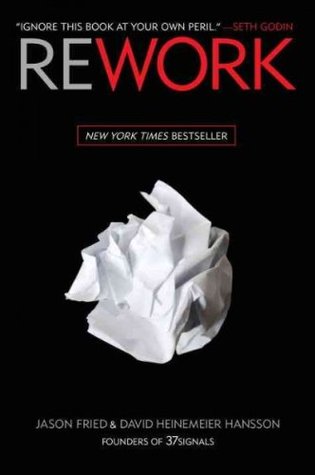Rework
08 Aug 2010
The feeling I got when I read the praise of the book in the first few pages was “This book is over-praised”. When I finished it, I still have the same feeling.
Maybe it’s just me, but I think that if you’re gonna challenge the foundations of doing business, you gotta back it up with something more that “That’s how we did it, and it worked for us”.
The book makes a great case against all the elements of doing business (planning, raising capital, meeting, communication, workplace, organizing, etc.) but it doesn’t offer strong alternative and it certainly doesn’t make a strong case for the alternative that it’s offering. Some of the criticism is just ridicules like Don’t make long term plan and Stop calling yourself an entrepreneur, call yourself a starter. Who cares?
A lot of the criticism is filled with “.. that doesn’t mean you should do away with this item, because it’s still important..”. If it’s still important then why come out against it like it’s some kind of a disease.
Other criticism falls under the category of a clever argument rather than a logical one, like “Learning from mistakes is overrated”, you should instead learn from your successes. Well, what if I’m just starting and all I have is my first failure??
Some ideas are just confusing. On page 159:
And of course, you want all that right away. So you drop everything else you’re working on and begin pursuing your latest, greatest idea.
Bad move.
And on the same page
So let your latest grand ideas cool off for a while first.
On page 271:
Inspiration is like fresh fruit or milk: It has an expiration date. If you want to do something, you’ve got to do it now. You can’t put it on a shelf and wait two months to get around it.
(eyes wide open of amazement)
The book offer some good ideas when it comes to marketing and hiring and more importantly it offers you a chance to break out of business traditions that has been built over decades and now accepted as a given. The point you should be taken from the book is that you should break free from all these rules and follow only the ones you feel that they make sense but it doesn’t make it that clear.
One very important thing is the book audience. This book is NOT for people working in any industry. Most of the ideas of this book are more suited for digital industries (especially software) rather than more transitional industries. What is worse is that the book doesn’t offer that distinction, it actually states very clearly that this book is for anyone who started a business, wants to start a business, or even working in a job they hate.
To sum up, “Follow your heart” is good motivation to jump off the cliff of career security into the uncharted territories of starting a business, it might be helpful from time to time when making decisions but it’s not a business strategy.

